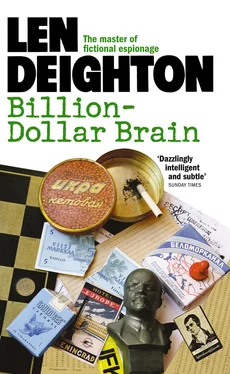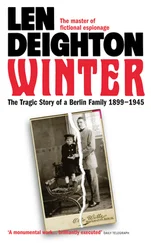The great challenge I faced when asked to produce the jackets for new editions of Len Deighton’s books was the existence of the brilliant designs conceived by Ray Hawkey for the original editions.
However, having arrived at a concept, part of the joy I derived in approaching this challenge was the quest to locate the various props which the author had so beautifully detailed in his texts. Deighton has likened a spy story to a game of chess, which led me to transpose the pieces on a chessboard with some of the relevant objects specified in each book. I carried this notion throughout the entire quartet of books.
Since smoking was so much part of our culture during the Cold War era, I also set about gathering tobacco-related paraphernalia. KGB officer Colonel Alexeyevitch Stok’s relish for caviar is only matched by his scholarly passion for the works of Robert Burns. A portrait of the poet sits beside a pack of Russian cigarettes illustrated with a map of the Soviet Union. The pack provides a haven for the ‘Red’ pawn.
During a visit to Moscow some years ago I returned with the small but hefty bust of Lenin. The revolutionary leader’s bronze head rests on a bed of computer punch-cards and a censored secret FBI file. A luggage label testifies to the book’s protagonist’s stay at Leningrad’s Hotel Europe, and a torn 5 Mark Finnish bank note provides a conventional ploy for our agent.
The cigarette cards on the back cover reflect the ever-present cricket match, and also the devotion to his vintage Riley motor car of George Dawlish, the public school-educated Senior British Intelligence officer and head of WOOC(P).
I photographed the jacket set-up using natural daylight, with my Canon OS 5D digital camera.
Arnold Schwartzman OBE RDI

This novel is entirely a work of fiction. The names, characters and incidents portrayed in it are the work of the author’s imagination. Any resemblance to actual persons, living or dead, events or localities is entirely coincidental.
Published by HarperCollins Publishers Ltd
1 London Bridge Street
London SE1 9GF
www.harpercollins.co.uk
First published in Great Britain by Jonathan Cape 1966
Copyright © Pluriform Publishing Company BV 1966
Introduction copyright © Pluriform Publishing Company BV 2009
Cover designer’s note © Arnold Schwartzman 2009
Cover design and photography © Arnold Schwartzman 2009
Len Deighton asserts the moral right to be identified as the author of this work
A catalogue copy of this book is available from the British Library
All rights reserved under International and Pan-American Copyright Conventions. By payment of the required fees, you have been granted the non-exclusive, non-transferable right to access and read the text of this ebook on screen. No part of this text may be reproduced, transmitted, down-loaded, decompiled, reverse engineered, or stored in or introduced into any information storage and retrieval system, in any form or by any means, whether electronic or mechanical, now known or hereinafter invented, without the express written permission of HarperCollins ebook
HarperCollins Publishers has made every reasonable effort to ensure that any picture content and written content in this ebook has been included or removed in accordance with the contractual and technological constraints in operation at the time of publication
Source ISBN: 9780586044285
Ebook Edition © MARCH 2015 ISBN: 9780007342990
Version: 2017-05-22
Spring is a virgin, summer a mother, autumn a widow, winter a stepmother.
RUSSIAN PROVERB
Two mythical countries (Kalevala and Pohjola) fight a perpetual war. They both want a magic mill that grinds endless salt, corn and money. The most important figure in this conflict is an old man named Vainamoinen. He is a wizard and a wise man. He is also a musician and plays tunes upon the bones of a pike. Vainamoinen woos a lovely young girl, Aino, but she drowns herself rather than marry an old man.
KALEVALA (a Finnish folk epic)
Mr Paul Getty … is quoted as having said that a billion dollars is not worth what it used to be.
NUBAR GULBENKIAN
Contents
Cover
Cover designer’s note
Title Page
Copyright
Epigraph
Introduction
Billion-Dollar Brain: Secret File No. 4
Section 1: London and Helsinki
Chapter 1
Chapter 2
Chapter 3
Section 2: London
Chapter 4
Chapter 5
Chapter 6
Chapter 7
Section 3: Helsinki
Chapter 8
Chapter 9
Chapter 10
Section 4: Leningrad and Riga
Chapter 11
Chapter 12
Chapter 13
Chapter 14
Section 5: New York
Chapter 15
Chapter 16
Section 6: San Antonio
Chapter 17
Chapter 18
Chapter 19
Section 7: New York
Chapter 20
Section 8: London
Chapter 21
Chapter 22
Chapter 23
Section 9: Helsinki and Leningrad
Chapter 24
Chapter 25
Chapter 26
Section 10: London
Chapter 27
Chapter 28
Appendix One
Appendix Two
Appendix Three
Footnotes
Keep Reading
About the Author
By Len Deighton
About the Publisher
‘Very few people go there. Even reporters who live there are restricted to the places they permit them to visit,’ said the lady in the travel agency . ‘And the organized bus tours are for sympathetic trade union people and party members. There would be lots of food and wine but you wouldn’t get to see anything much. You wouldn’t like that, would you?’
‘No,’ I said.
‘There is another way but we have never tried it. You have to pay for an interpreter who is with you all the time.’
‘Could I go where I liked?’
‘That’s what the Russians say. But your interpreter will be some kind of secret police stooge and it will be very expensive.’
‘I’ll try it.’
The lady in the travel agency was right about very few Westerners going to the Baltic States. And in the frozen depth of winter visitors were non-existent. But once there the frustrations, delays and stupidity that I had suffered in getting permission to go to Latvia proved worthwhile. This satellite of the Soviet Union, deep behind the iron curtain, and in a region the Russians considered strategically vital, was astonishing. The wartime England in which I’d grown up was a dismal and deprived place but visiting Riga at that time was like a giant step back in time. The people in wartime England had never lost their underlying optimism that one day the war would be won, and good times restored. But the city of Riga was a quite different environment; a large prison camp with an occupying Russian army arresting anyone who smiled.
My interpreter never smiled. Like ‘sinister KGB agent’ sent from Central Casting, she was a tall, middle-aged woman with the pale complexion that permanent winter confers. Her long fingers constantly fidgeted as they stroked her dark sable coat or adjusted the fit of an imposing hat of matching fur. In a country where opportunities for investment were few, valuable furs were not uncommon, but its possession still proclaimed her status. Sometimes she removed her hat to reveal hair tightly held in a bun by decorative hairpins. She puzzled about the sort of places I wanted to see as research for the book but after saving me a couple of times when I stepped out in front of speeding army trucks, and interceding when I made a rude sign to a traffic cop, she obviously decided that I was too stupid to be a spy. After a few days she went home each evening and left me to my own devices. I usually said I was going to a concert or to the opera. But an opera in Latvian is not easy to follow; trust me, I know.
Читать дальше














